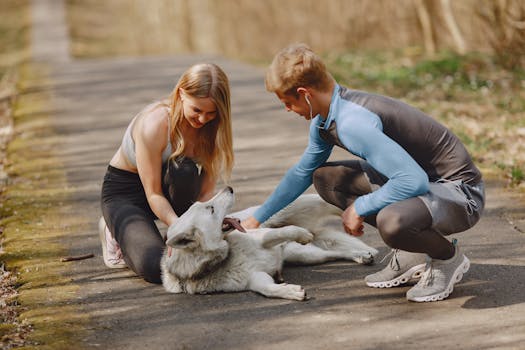Takeaways

The Positive Impact of Dogs on Seniors’ Mental Health

Emotional Support and Companionship
One of the most profound ways dogs help seniors is through companionship. Dogs provide unconditional love and support, which can be especially comforting for those who may have lost a spouse or friends. The presence of a dog can reduce feelings of loneliness, making seniors feel more connected to the world around them.
Furthermore, interacting with dogs can trigger the release of oxytocin, the hormone associated with bonding and affection. This biochemical response not only boosts mood but also strengthens the bond between the senior and their furry friend, fostering a sense of purpose and belonging.
Promoting Physical Activity
Regular exercise is crucial for maintaining physical health, especially for seniors. Dogs require daily walks, which encourages seniors to get outside, enjoy fresh air, and engage in physical activity. Whether it’s a leisurely stroll around the neighborhood or a more vigorous hike, having a dog motivates seniors to stay active.
Moreover, physical activity has numerous health benefits, including improved cardiovascular health, better mobility, and increased strength. The routine of walking a dog can also create a structured daily schedule, which can be beneficial for mental health and overall well-being.
Social Interaction Opportunities
Owning a dog often leads to increased social interactions. Dog parks, pet-friendly events, and community activities centered around pets provide opportunities for seniors to meet and connect with others. These social interactions can reduce feelings of isolation and create a supportive community environment.
Additionally, when seniors walk their dogs, they are more likely to engage with neighbors and other dog owners, fostering friendships and enhancing their social circle. This sense of community can be incredibly beneficial in promoting happiness and emotional well-being.
The Therapeutic Effects of Dogs on Seniors

Reducing Stress and Anxiety
Studies indicate that the mere presence of a dog can lower cortisol levels, the hormone associated with stress. Therapy dogs help create a calming environment, allowing seniors to feel more relaxed and at ease. The touch of a dog’s fur, the sound of their breathing, and the warmth of their presence can all contribute to a significant reduction in anxiety levels.
Moreover, spending time with a dog can serve as a distraction from worries and negative thoughts. Engaging in activities such as petting, playing, or simply being near a dog can provide seniors with a sense of peace and contentment.
Encouraging Routine and Responsibility
For many seniors, having a dog instills a sense of routine and responsibility. Feeding, grooming, and caring for a dog can provide a daily structure that may be lacking in their lives. This routine can be beneficial for mental health, offering a sense of purpose and accomplishment.
The act of caring for a living creature can also boost self-esteem and enhance a senior’s sense of worth. Knowing that they are needed and that their dog relies on them can be incredibly fulfilling, helping seniors feel more engaged with life.
Choosing the Right Dog for Seniors
Choosing a dog that fits well with a senior’s lifestyle is essential. Not all breeds are suitable for older adults, so it’s important to consider factors such as size, energy level, and temperament. Smaller breeds or those with calmer dispositions may be ideal for seniors who may have mobility issues or prefer a less demanding pet.
Considerations When Adopting a Dog
When adopting a dog, seniors should consider their living situation, health, and ability to care for a pet. Additionally, adopting a dog from a shelter can be a rewarding experience, as it not only provides a loving home for the animal but also contributes to the community.
Involving family members or friends in the decision-making process can also be beneficial, ensuring that the senior has a support system in place as they welcome a new furry friend into their lives.
Training and Support
Training is crucial for both the dog and the owner. Enrolling in training classes can be a great way for seniors to bond with their new pets while also learning how to manage their behavior. Additionally, support from local pet communities or organizations can provide resources and assistance as seniors navigate pet ownership.
In conclusion, dogs play an invaluable role in enhancing the happiness and well-being of seniors. Through companionship, physical activity, social interaction, and therapeutic benefits, these loyal creatures help create a fulfilling and joyful life for elderly individuals.






